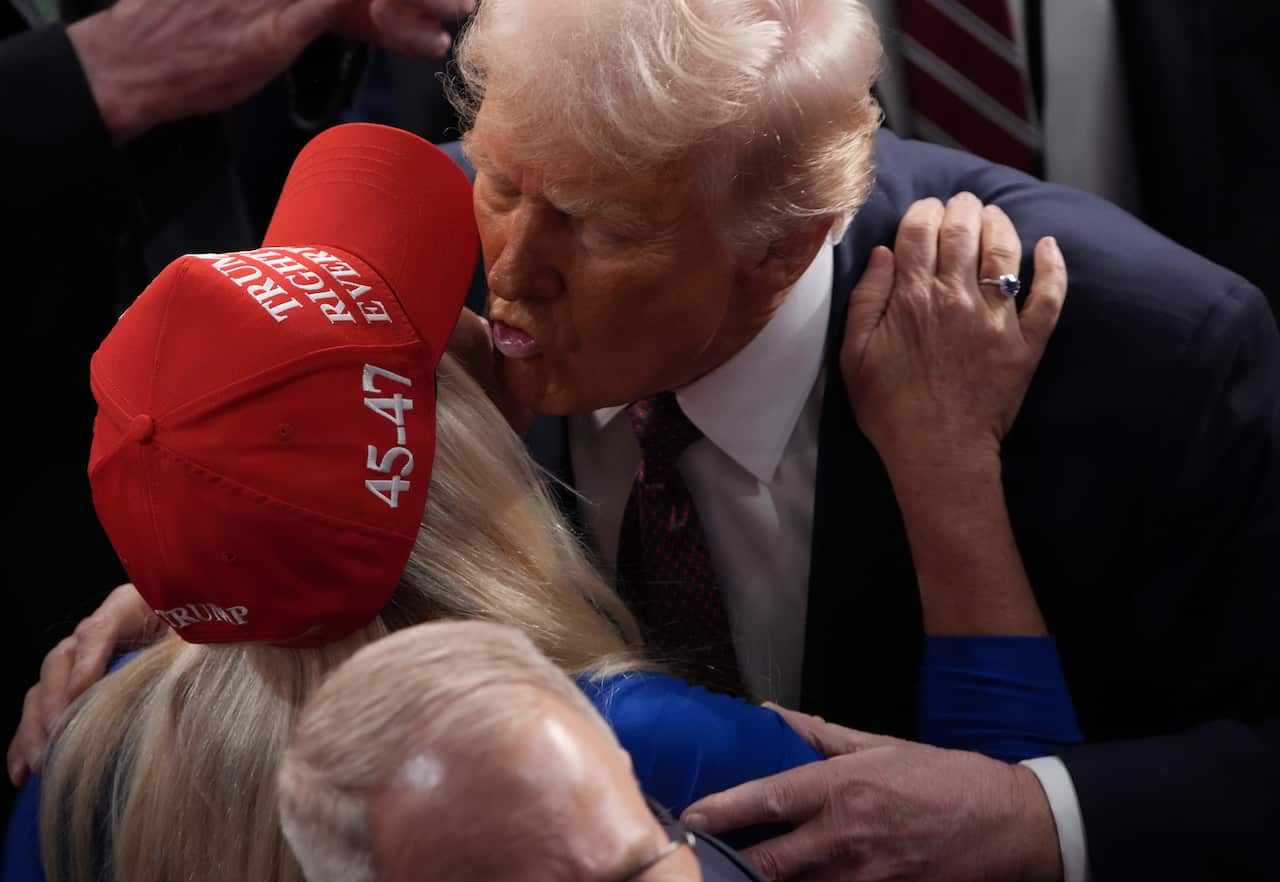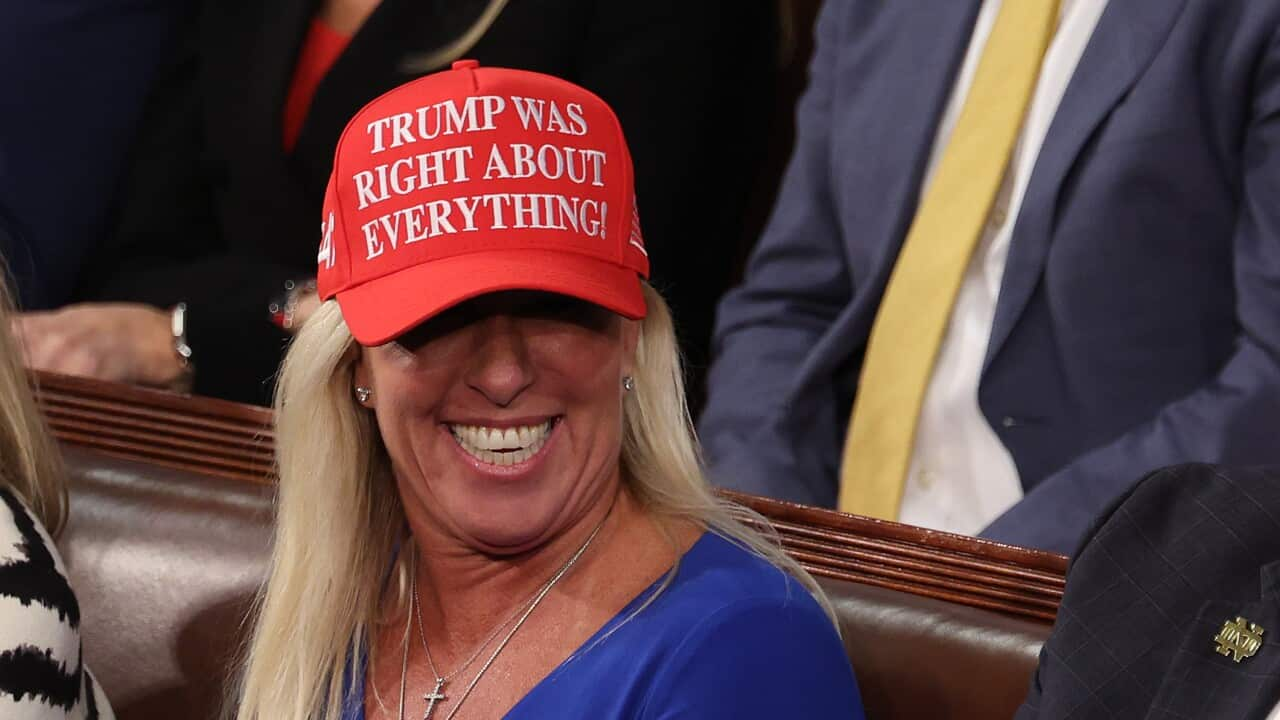This article contains references to rape and sexual abuse.
Hard-right Republican Marjorie Taylor Greene, once one of Donald Trump's most loyal allies, set off shockwaves this weekend when she announced her surprise resignation from the United States Congress.
In the midst of a public falling out between the pair last week, Trump said he was withdrawing his support for the Georgia politician and signalled that he was open to endorsing a Republican challenger to her House seat next year.
In a video posted to social media announcing her resignation, Greene said she was not prepared to "endure a hurtful and hateful primary against me by the President we all fought for".
Reacting to her resignation, Trump wrote on his Truth Social platform that Greene was stepping back "because of PLUMMETING poll numbers, and not wanting to face a primary challenger with a strong Trump endorsement (where she would have no chance of winning!)".
He referred to Greene by his nickname for her, Marjorie 'Traitor' Brown — because green grass "turns brown when it begins to rot" — and said his former ally had gone "bad".
During an interview with the US' ABC News, Trump said Greene's resignation was "great news for the country".
Greene said her resignation was effective on 5 January, five years since she took office following her election in 2020.
Her tenure has been marked by inflammatory rhetoric, personal attacks against opponents, the promotion of conspiracy theories and, until this year, unwavering loyalty to Trump's Make America Great Again (MAGA) movement.
So what happened?
What caused the relationship to fracture?
In the lengthy video posted to X about her resignation, Greene stressed that she had one of "the most conservative voting records in Congress", citing opposition to abortion and COVID vaccines.
But she indicated that she was unhappy with Republican positions on a range of issues, including the release of the Jeffrey Epstein files, American involvement in foreign conflicts, the handling of the record-breaking government shutdown and skyrocketing healthcare premiums.
Cracks had begun to show months before her alliance with Trump splintered publicly.

In June, after Trump authorised US strikes on Iran amid its conflict with Israel, Greene loudly criticised the decision to get involved in "another senseless foreign war".
While it marked a rare break with the president, she insisted at the time that disagreeing with the Republican leader was "not disloyalty".
She's since butted heads with the administration on several additional issues, particularly the release of files related to the late convicted sex offender Epstein.
In September, she said she had received "a lot of pushback" from the White House over her support for a discharge petition aiming to force the release of Epstein documents.
Trump, a former Epstein associate, had faced months of political turmoil and pressure to release the files, which he claimed were part of a Democrat-led "hoax".
"It’s not a hoax, because Jeffrey Epstein is a convicted paedophile. That takes away the whole hoax thing. It's not a hoax. It's not a lie," Greene said in September.
Trump dropped his opposition last week and has since signed a bill that Congress passed ordering the release of the documents.
Before Congress voted overwhelmingly in support of the files' release, Trump had called her a "traitor", a "disgrace" to the Republican Party, and a "ranting lunatic".
Greene, when announcing her resignation, defended her push to have the files released.
"Standing up for American women who were raped at 14, trafficked and used by rich, powerful men, should not result in me being called a traitor and threatened by the president of the United States, whom I fought for," she said.
Greene had also criticised Trump's support for Israel during its war on Gaza, and was the first Republican to accuse Israel of committing "genocide", something Israel denies.
Greene also criticised Trump's meeting earlier this month with Syrian President Ahmad al-Sharaa.
She called on him to focus on domestic issues such as unaffordable healthcare, rather than "nonstop meetings" with foreign leaders.
Trump said at the time she had "lost her way".
In her video announcing her resignation, Greene highlighted her longtime loyalty to Trump and said it was "unfair and wrong" that he had publicly attacked her for disagreeing on certain issues.
Turning away from 'toxic' rhetoric?
Greene publicly defied Republican leadership during the US government shutdown by raising alarm over expiring healthcare subsidies — a core issue for Democrats in the stalemate.
In another uncharacteristic turn, Greene was cordial earlier this month when former House speaker Nancy Pelosi announced she would not seek reelection after nearly four decades in office.
Greene said she was "very impressed with her ability to get things done".
"I wish [Republicans] could get things done for our party like Nancy Pelosi was able to deliver for her party," she said.
It was a marked departure from some of her previous rhetoric.
In Greene's early months in Congress, she faced a political firestorm after CNN surfaced social media posts from 2018 and 2019 in which she liked comments suggesting that prominent Democrats, including Pelosi, could be executed.
After Trump withdrew his support for Greene last week, she told CNN his "hurtful" comments, including branding her a "traitor", could radicalise people and put her life in danger.
She conceded that it was "fair criticism" when she was asked why she didn't disavow such incendiary rhetoric until it was aimed at her.
She said she had introspected a lot since the assassination of conservative activist Charlie Kirk in September.
"I would like to say, humbly, I'm sorry for taking part in the toxic politics; it's very bad for our country," she said.
If you or someone you know is impacted by sexual assault, call 1800RESPECT on 1800 737 732, text 0458 737 732, or visit 1800RESPECT.org.au. In an emergency, call 000.
For the latest from SBS News, download our app and subscribe to our newsletter.

